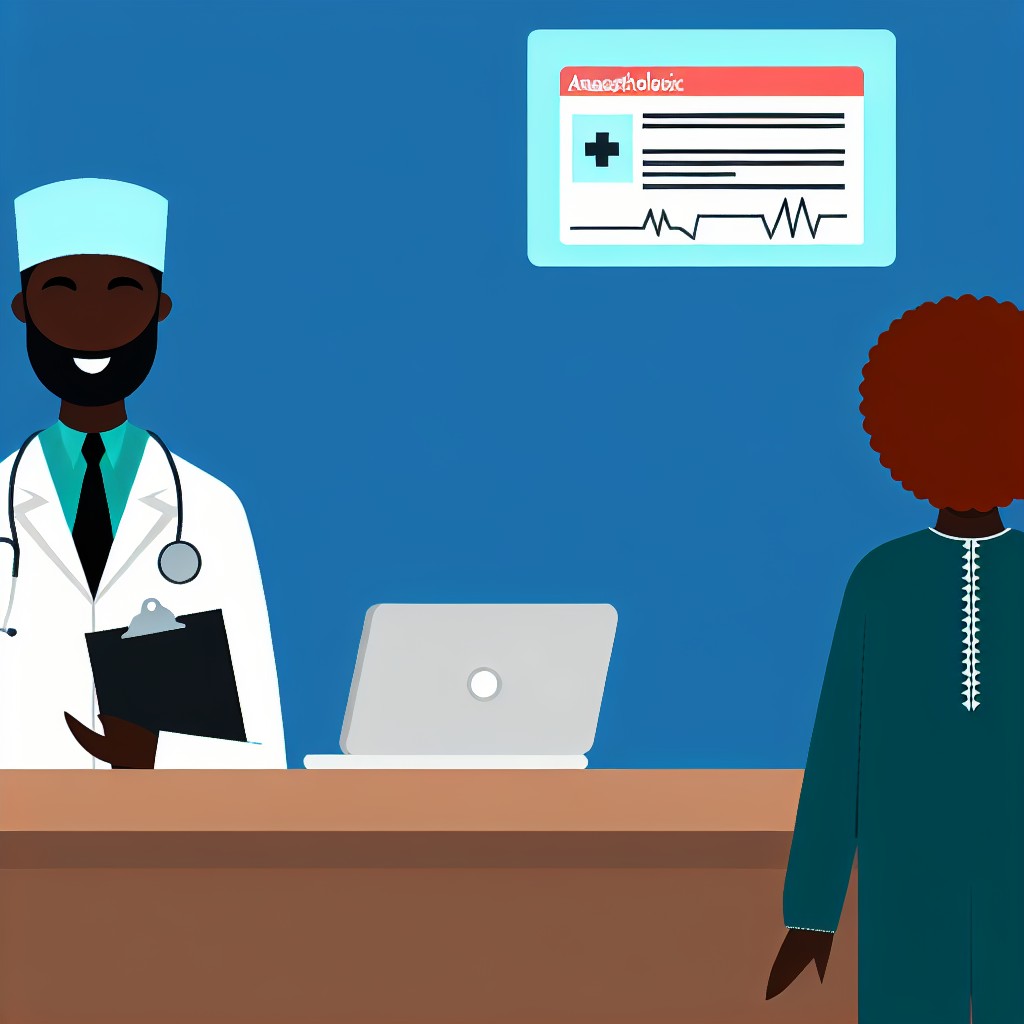Introduction
Anaesthesiology is a critical medical specialty.
It focuses on pain management and sedation during surgical procedures.
Explanation of what anaesthesiology is
This field involves administering drugs to patients.
Professionals monitor patients to ensure a pain-free surgical experience.
They also work to maintain patient safety throughout procedures.
Importance of anaesthesiology in medical practice
Without anaesthesiologists, surgeries would be unbearable for patients.
Pain control is essential to reduce surgical risks effectively.
Anaesthesiology also helps improve patient outcomes and recovery times.
Overview of anaesthesiology in Nigeria
Anaesthesiology is gaining recognition and importance within Nigeria’s medical field.
The specialty plays a vital role in the country’s healthcare development.
As Nigeria upgrades its healthcare system, demand for skilled anaesthesiologists increases.
History of Anaesthesiology in Nigeria
Timeline of the Development of Anaesthesiology in the Country
The development of anaesthesiology in Nigeria can be traced back to the early 20th century.
1915: The first official documentation of anaesthetic services being provided in Nigeria.
1930s: The establishment of the first dedicated anaesthetic department in a Nigerian hospital.
1950s: Introduction of modern anaesthetic techniques and equipment in major hospitals.
1980s: Significant expansion of anaesthetic services across various healthcare facilities in Nigeria.
- The development of anaesthesiology began in the early 1900s.
- 1915: The first official records of anaesthetic services.
- 1930s: First anaesthetic department created.
- 1950s: Modern techniques introduced.
- 1980s: Services expanded widely.
Key Milestones and Contributions
Several key milestones have marked the progress of anaesthesiology in Nigeria.
Training Programs: Establishment of residency programs in Anaesthesiology in Nigerian universities.
Research: Contribution of Nigerian anaesthesiologists to international research in the field.
Advocacy: Championing for improved standards and regulation of anaesthesia practice in Nigeria.
Technology: Adoption of advanced anaesthesia technology for better patient care outcomes.
- Key milestones drove progress in the field.
- Training Programs: Residency programs developed across universities.
- Research: Nigerian experts contributed globally.
- Advocacy: Efforts to improve standards and regulations.
- Technology: Use of modern anaesthetic equipment and methods.
Challenges Faced in the Early Years
The early years of anaesthesiology in Nigeria were not without challenges.
Lack of Awareness: Limited knowledge among the population about the importance of anaesthesia.
Resource Constraints: Shortage of trained anaesthesiologists and necessary equipment.
Infrastructure: Inadequate facilities and infrastructure for safe anaesthesia administration.
Regulation: Lack of robust regulatory frameworks for anaesthesia practice in the country.
- Several challenges hindered early development.
- Lack of Awareness: Public knowledge about anaesthesia was low.
- Resource Constraints: There were few trained practitioners and limited equipment.
- Infrastructure: Facilities were inadequate for safe practice.
- Regulation: Regulatory frameworks were weak or absent.
Training and Education in Anaesthesiology
Aspiring anaesthesiologists in Nigeria must complete extensive training and education.
They must become certified professionals in this field.
Requirements to Become an Anaesthesiologist in Nigeria
- Medical degree from a recognized university.
- Completion of a residency program in anaesthesiology.
- Passing the licensing exams conducted by the Medical and Dental Council of Nigeria.
- Continuing medical education to stay updated with the latest advancements in the field.
Overview of the Training Programs Available
In Nigeria, there are various institutions and hospitals that offer residency training programs in anaesthesiology.
These programs provide a comprehensive understanding of the specialty.
They include hands-on training in different settings.
During residency, trainees gain exposure to sub-specialties within anaesthesiology.
These sub-specialties include pediatric anaesthesia, obstetric anaesthesia, critical care, and pain management.
Such exposure helps them acquire diverse clinical experience and expertise.
Significance of Continuous Education and Professional Development
- Advancements in medical technology and techniques demand continuous learning.
- Continuous education ensures anaesthesiologists provide high-quality care to patients.
- Professional development opportunities help anaesthesiologists stay updated with best practices.
- Continuous education is essential for career growth and enhancement of skills.
Training and education form essential components of becoming a successful anaesthesiologist in Nigeria.
Continuous learning and professional development are crucial for staying competent and delivering optimal patient care.
You Might Also Like: Funding and Scholarships for Rehab Students Nigeria
Role of Anaesthesiologists in Healthcare
- Anaesthesiologists play a crucial role in ensuring the safety and well-being of patients during surgical procedures.
- They are responsible for administering anaesthesia to patients before.
- They administer anaesthesia during and after surgical interventions.
Responsibilities of Anaesthesiologists in Hospitals
- Anaesthesiologists monitor vital signs such as heart rate and blood pressure.
- This monitoring ensures patients are stable throughout the surgery.
- They adjust the dosage of anaesthetic drugs based on patient response.
- Adjustments depend on the requirements of the procedure.
Critical Importance of Anaesthesiologists During Surgery
- Without the expertise of anaesthesiologists, surgeries would be impossible to perform.
- Patients would experience pain and discomfort without proper anaesthesia.
- Anaesthesiologists provide pain relief during surgical procedures.
- They ensure patients remain unconscious and immobile during operations.
Collaboration of Anaesthesiologists with Medical Teams
- Anaesthesiologists work closely with surgeons, nurses, and healthcare professionals.
- This collaboration ensures optimal patient care and safety.
- They communicate effectively with the surgical team.
- This communication helps coordinate anaesthesia timing and monitor patient condition.
Delve into the Subject: Preventing Cavities in Nigerian Children
Anaesthesia Techniques and Procedures
When it comes to anaesthesia techniques and procedures in Nigeria, many common methods are used by anaesthesiologists.
Common Techniques Used in Nigeria
- General Anaesthesia: This involves putting the patient to sleep using a combination of medications to ensure unconsciousness during surgery.
- Regional Anaesthesia: Anaesthesiologists block sensation in a specific region of the body, such as an arm or leg, using local anaesthetics.
- Local Anaesthesia: This method numbs only a small, specific area of the body. It is often used for minor surgical procedures or dental work.
- Sedation: Sometimes called “twilight sleep,” sedation helps patients relax and remain calm during minor procedures without full unconsciousness.
Overview of Anaesthesia Administration
Administering anaesthesia is a precise and delicate process requiring careful monitoring and expertise.
Transform Your Career with Expert Guidance
Get personalized mentorship consulting that’s tailored to your unique path. Our expert advice is actionable and exclusive.
Get StartedAnaesthesiologists in Nigeria follow a systematic approach to ensure patient safety.
Before the procedure, the anaesthesiologist assesses the patient’s medical history, allergies, and current medications.
This helps determine the most appropriate anaesthesia plan.
During the procedure, the anaesthesiologist continuously monitors the patient’s vital signs.
They check heart rate, blood pressure, and oxygen levels to keep the patient stable.
After the procedure, the anaesthesiologist monitors the patient as they wake up from anaesthesia.
They ensure a smooth transition to consciousness and manage post-operative pain or discomfort.
Potential Risks and Complications of Anaesthesia
- Allergic Reactions: Some patients may have mild to severe allergic reactions to anaesthesia medications.
- Respiratory Issues: Rarely, breathing difficulties or respiratory depression may occur during anaesthesia.
- Cardiovascular Complications: Patients with pre-existing heart conditions face higher risks of cardiovascular problems.
- Post-operative Nausea and Vomiting: These symptoms can occur after waking up and are manageable with medications.
- Neurological Effects: Occasionally, patients may experience temporary confusion, memory loss, or other cognitive effects.
Anaesthesia techniques in Nigeria follow international standards and address local healthcare needs.
Anaesthesiologists play a crucial role in patient comfort, safety, and successful surgical outcomes.
Explore Further: Common Pathogens Studied in Nigeria

Advancements in Anaesthesiology in Nigeria
Introduction of New Technologies and Equipment
Anaesthesiology in Nigeria has seen significant advancements in recent years.
The introduction of new technologies and equipment has revolutionized the practice.
One key development is the use of advanced monitoring devices that allow anaesthesiologists to closely monitor vital signs during surgery.
The introduction of ultrasound-guided regional anaesthesia techniques has improved the precision and efficacy of nerve blocks.
This advancement reduces the risk of complications and enhances patient comfort.
Impact of Advancements on Patient Care
These advancements have had a profound impact on patient care in Nigeria.
The use of new technologies and equipment has enhanced the safety and efficacy of anaesthesia administration.
This improvement leads to better outcomes for patients undergoing surgical procedures.
Improved monitoring devices have allowed anaesthesiologists to quickly detect and respond to changes in a patient’s condition.
This response ability reduces the risk of complications and improves overall patient safety.
Furthermore, advanced techniques such as ultrasound-guided regional anaesthesia result in better pain management.
Patients also experience faster recovery times, which ultimately improves their quality of life post-surgery.
Challenges and Opportunities in Adopting New Practices
Despite the many benefits, challenges exist in adopting new anaesthesiology practices in Nigeria.
One major obstacle is limited access to advanced technologies and equipment.
Financial constraints and infrastructure limitations contribute to this restricted access.
Additionally, there is a lack of adequate training and education for healthcare professionals to use new technologies effectively.
To overcome these challenges, increased investment in healthcare infrastructure is essential.
Training programs must also expand to ensure anaesthesiologists acquire the necessary skills.
Such investment will provide the resources needed to incorporate advancements into daily practice.
Moreover, new practices create opportunities for collaborations with international organizations.
Partnerships with industry leaders can facilitate the transfer of knowledge and technology to Nigeria.
You Might Also Like: Mental Health Services: Finding Support in Nigeria
When it comes to anaesthesiology in Nigeria, the role of anaesthesiologists in public health initiatives is crucial.
These professionals play a vital role in ensuring that patients receive safe and effective anesthesia during surgical procedures.
They also manage pain post-operatively.
Role of Anaesthesiologists in Public Health Initiatives
Anaesthesiologists are responsible for administering anesthesia during surgeries.
They manage pain and ensure the safety of patients throughout the entire perioperative period.
These specialists work closely with other healthcare professionals to provide comprehensive care to patients.
In public health initiatives, anaesthesiologists educate the public about the importance of safe anesthesia practices.
They also inform communities about pain management strategies.
Additionally, anaesthesiologists contribute to research and policy development focused on improving anesthesia services in Nigeria.
Access to Anaesthesia Services in Rural Areas
Limited access to anesthesia services in rural areas is one of the biggest challenges in Nigeria.
Many remote communities lack trained anaesthesiologists and adequate resources to support safe anesthesia practices.
To address this issue, anaesthesiologists collaborate with government and non-profit organizations.
They bring essential anesthesia services to underserved regions.
This collaboration may include setting up mobile clinics.
They also provide training to local healthcare workers in anesthesia.
Furthermore, anaesthesiologists help establish referral systems for patients needing surgical care.
Collaborative Efforts to Improve Anesthesia Care
Collaboration between anaesthesiologists, government agencies, and non-profit organizations is essential to improving access.
Working together helps identify areas of need more effectively.
Teams develop sustainable solutions through joint efforts.
They also implement strategies that address gaps in anesthesia care across Nigeria.
Government support plays a critical role by funding training programs.
It also aids infrastructure development and equipment procurement.
These efforts ensure anesthesia services become accessible to all Nigerians.
Non-profit organizations contribute by providing humanitarian aid and medical supplies.
They also offer technical assistance to enhance anesthesia services in underserved communities.
Anaesthesiologists in Nigeria play a vital role in public health initiatives.
They ensure the safe and effective delivery of anesthesia services to patients.
Collaborating with government and non-profit organizations helps improve access to anesthesia services in rural areas.
Such cooperation also contributes to the overall health and well-being of the Nigerian population.
Role of Anaesthesiology in Nigeria’s Healthcare System
Anaesthesiology plays a crucial role in Nigeria’s healthcare system.
It ensures safe and effective pain management for patients undergoing surgical procedures.
Recognition and Support for Anaesthesiologists
It is imperative to recognize anaesthesiologists in the country for their vital contributions.
Supporting these specialists enhances healthcare delivery across Nigeria.
Advancements and Future Prospects in Anaesthesiology
The future outlook for anaesthesiology in Nigeria is promising due to advancements in technology.
Training programs also continue to improve and strengthen the field.
As healthcare outcomes improve, the expertise and dedication of anaesthesiologists remain invaluable.
Additional Resources
Challenges in critical care services in Sub-Saharan Africa …




